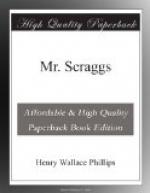“‘At first,’ he says, ‘you might git the idee there was somethin’ jubeeous in these preceedin’s, but there ain’t. I knew a man that once upon a time was the honestest man ever lived. Honest? Why, I’ve known that man to go to bed weepin’, he felt so bad to learn George Washington stole a march on the enemy. “I never would have believed it of George if it hadn’t been in the book,” he says. That’s the kind of a man he was—just your sort to a dot. Well, sir, he has an honest claim agin these United States for damage and raisin’ the divil with his farm durin’ the Civil War. And do you suppose these here United States, E Pluribus Unum, In God We Trust, paid that bill? Not on the tintype of your grandfather. When he goes to Washington with it, the President he says, “Now, I’d pay you this in a minute, Billy,” he says, “but think of them Congressmen!” and the President he shakes his head and Billy comes home again. And from that time on, before his very eyes, he has to see his widder and eighteen helpless children die of starvation through not havin’ enough to eat, right in front of his face—ain’t that fierce?’ says he.
“‘Ya-a-as,’ says I.
“’Well, at last this man gets a job in the Treasury; it didn’t pay much—just enough to live on. He had charge of the banknotes before the Secretary signs ’em, to make good. Now, here comes in the curious part of it: my friend’s handwritin’ and the Secretary’s handwritin’ was that much alike neither man could tell one from t’other. This gives my friend the idee of how to break even with Uncle Sam. He just naturally laid his hooks on ten thousand dollars’ worth of one-hundred-dollar notes and flew the coop, waitin’ to sign ’em and dispose of ’em at leisure, thus payin’ his own claim. But here comes a hitch; after he done it his conscience bit him; the notes was good; he passed a lot of ’em with no trouble, but he quit on the play. Now, if some good, honest man, yet not quite so honest as all that, wanted to turn a dollar, he could buy two thousand dollars’ worth of them bills for one hundred ordinary cold money. It’s this way, too,’ says he. ’It ain’t only conscience; the old man’s mortal scart; he’s always dreamin’ of Secret Service men comin’ in on rubbers. Now, ain’t that an opportunity?’
“‘Ya-a-as,’ says I.
“‘Well,’ says he, lookin’ at his watch, ’it’s now my time to eat, Mr. Scraggs, and I’ve took up so much of your valuable time chinnin’ here, I don’t feel I could do less than share my simple repast with you. I’m a stock-broker myself,’ he says, ’but none of these durned rich ones, so if you can stand for once to eat a meal not exceedin’ five dollars in price, why, come along!’ says he.
“Then we went into a high-toned vittel dispensary, I bet you. Jeemima! but she was gold and white paint to knock your eye out. I’ll never tell you what I et, but it was good food. And to wind up, come little cups of coffee and big seegars. It was beautiful. Then says my man, ’Well, this is a day in a hundred. I can’t tell you how good it makes me feel in this city of sin to come across a square man like yourself—what do you say to a bottle of wine?’




